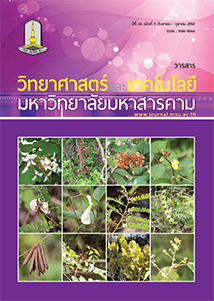Effects of Agricultural Practices on Growth, Yield, and Quality of Jerusalem Artichoke
Main Article Content
Abstract
Kaentawan (Jerusalem artichoke) a is tuber crop and has high potential as a functional food, alternative source of green energy production, animal feeds and important source of inulin. However, the knowledge about variety and cropping practices has not been intensively reported in Thailand. Preliminary yield trials revealed that tuber yield of this crop was very low under growing conditions in Thailand. The yield should be increased considerably through the use new high yielding varieties. Moreover, cropping practices can also increase growth, yield and quality of Kaentawan. Most parts of the stolon can be used. The seed tuber should be incubated in a plastic bin with burned rice hull prior to planting assuring a high germination percentage, uniformity of seedling in field conditions and convenient to harvesting. Jerusalem artichoke could be grown in all year round, but the most appropriate planting date is in March. The cool season (November to January) should be avoided because the plants showed severe stunting with this planting date. Moreover, irrigation and fertilization could also be increased the growth and yield of Jerusalem artichoke. Harvesting of Jerusalem artichoke might be carried out as early as 75-105 days after planting without significant yield loss.
Article Details
Section
Original Articles


